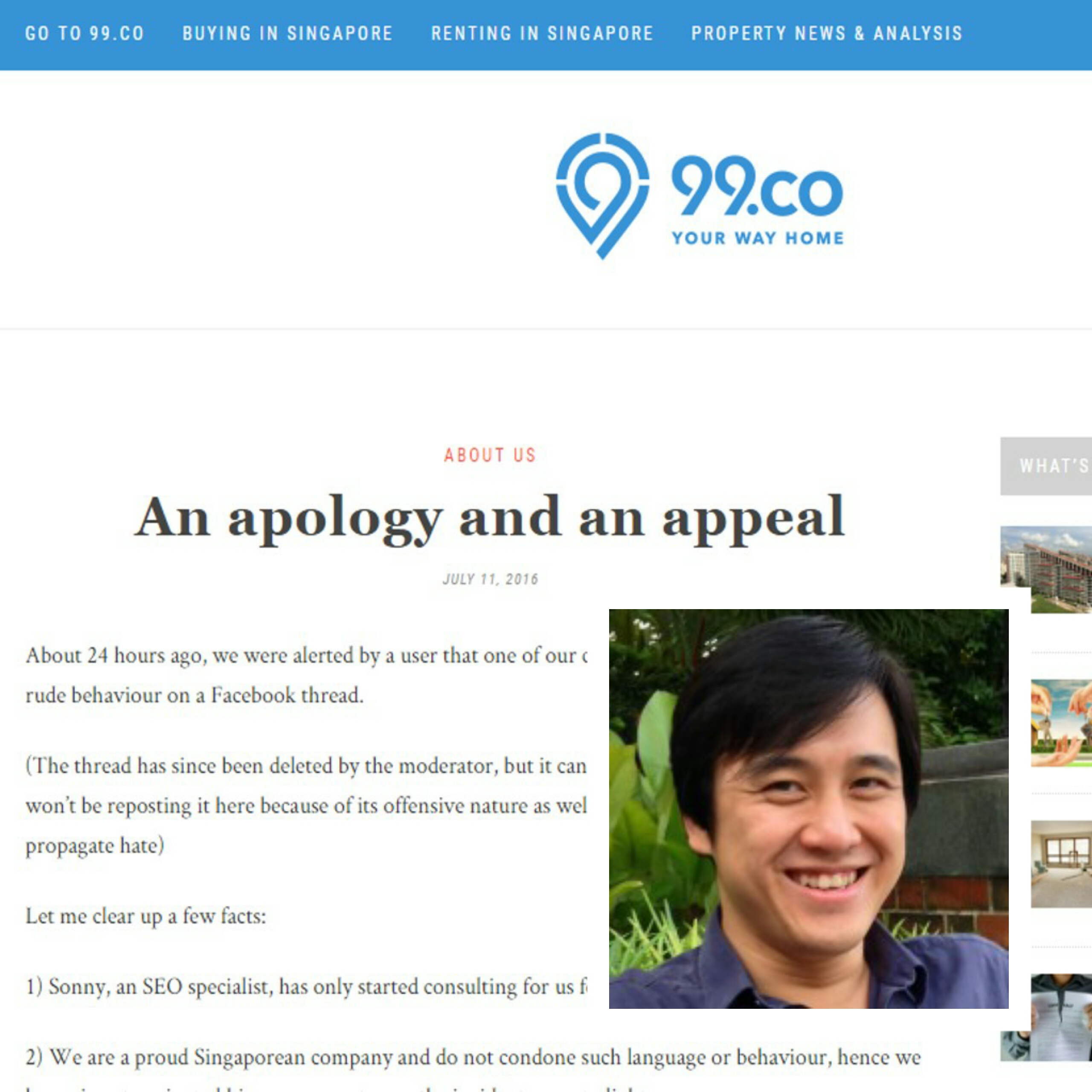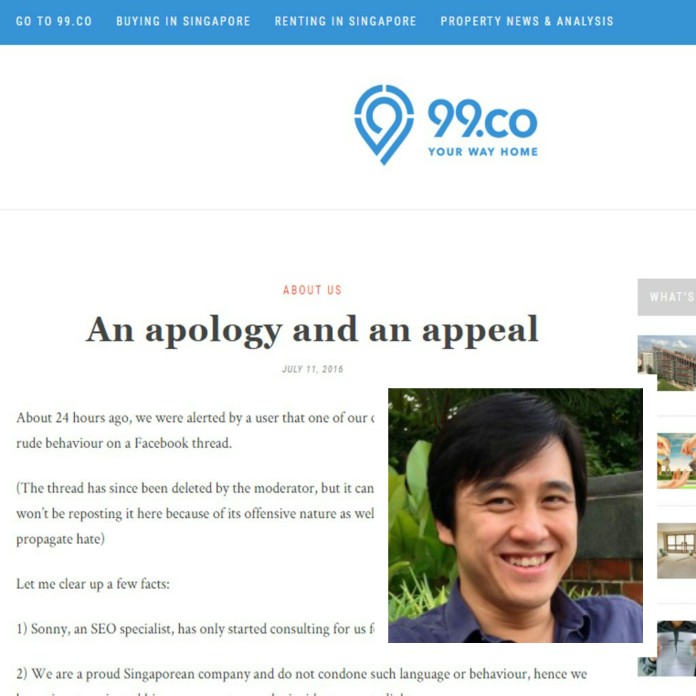SINGAPORE: Huttons Asia currently occupies an unenviable position, if user-generated peer reviews and ratings on social media pages are anything to go by. In late October, the property firm saw its star rating on Facebook nosedive, as it was hit by more than 500 one-star reviews in just a few hours.
Huttons’ public rating fell to 1.7 (out of a maximum of 5), from a solid 4.5 just weeks earlier. Its offence? One of its property agents had been identified by Internet vigilantes – working off a photo of the car’s number plate – as the culprit in a hit-and-run accident involving a shelter dog.
There was just one problem. The property agent is the registered owner of the car, but she was not the driver at the time of the accident. Despite the emergence of that important detail, the damage to the reputation of Huttons and the agent – seemingly innocent parties – was done, as armchair warriors went on the attack in a search for online justice.
When contacted by Channel NewsAsia, Huttons’ Senior Operations & Administration Manager Derrick Law declined to comment, explaining that the company is unable to say more as “the matter is now before the Police”.
Meanwhile, property agent Soon Kim Choo issued a statement through her lawyer James Ow Yong of Kalco Law, saying that the hurtful and untruthful posts – based on unverified information – have tarnished her name, affected her livelihood, and hurt her and her family.
“The company I represent has also suffered loss of reputation and goodwill. All my other colleagues have been adversely affected as well,” noted Ms Soon, adding that she hopes that “there is no more basis for vigilante action” as the case has been filed with the police.
In a world where our lives are increasingly lived out online, where peer review scores matter and the cover of anonymity encourages vitriol and witch hunting – what can be done when hit by the wrath of netizens?
SURVIVING AN ONLINE LYNCHING
Just this July, Australian expatriate Sonny Truyen was let go from online property portal 99.co, after labeling Singapore a “piece of f***ing s*** country” in a post complaining that Pokemon Go was not yet available in the country.
Within 24 hours of the post blowing up, 99.co founder Darius Cheung terminated Mr Truyen’s contract. It also apologised in a blog post on the company website and on popular online forum Hardware Zone – where calls to boycott 99.co were among the loudest. Mr Cheung also took the opportunity to urge Singaporeans to rise above the xenophobic hate speech directed at Mr Truyen.

99.co’s founder Darius Cheung (inset) explained why he fired SEO consultant Sonny Truyen in a blog post on July 11. (Screengrabs: 99.co)
“Let’s put it this way: If (Mr Truyen’s comments) happened privately and didn’t become a public issue, we might have just let him go quietly if we found out about it. The only difference is, there would be no need to make an announcement out of it,” Mr Cheung told Channel NewsAsia.
“I don’t see it as reputation management or social media management… We believe that what he said has created more damage and created more divides in the society, and in our immediate context, in the company, so we will not tolerate that,” he said, adding that the blog post was also an important way to take back control of the discourse and explain his position to alll 99.co employees, clients, and vendors.
Mr Cheung, who was largely praised by Singaporean netizens for handling the matter swiftly and sensibly, also said that the incident has not had a material impact on listing and visitor numbers to 99.co.
AUTHENTICITY MATTERS
If it is a case of mistaken identity, as in the Huttons case, the Internet generally moves on. If culpability is proven, the company may need to be seen to take a stand on and account for the behaviour of its employee, even if he or she was acting in a personal capacity.
According to Singapore Management University Associate Professor of Marketing Education Seshan Ramaswami, “a quick, sincere, non-defensive apology for the poor judgment – of an employee acting by herself, or by the company’s own managers” can help stop the spread of negative posts and also “create positive goodwill and further the image of a responsible and consumer-oriented firm”.
Asia PR Werkz Director Sharon Koh added that effort should also be made to craft the apology in plain language, free from corporate jargon. She explained: “The tone of a company’s response to mainstream media may differ from that of their own posts online, as netizens generally do not respond well to ‘blanket statements’ or ‘official replies’.”
And in severe cases which involve sackings, it is important for a company leader or senior personnel to come forward. “It goes down much better than an apology from a spokesperson,” said Ms Koh, who also noted the area of online reputation management has featured more and more in her crisis communications work in the last five years.
“If we have to put a number to it, we’d say that currently, almost 80 per cent of our crisis clients have to consider online reputation, and about 30 per cent of our crisis clients are concerned entirely with online reputation,” she elaborated.
Besides 99.co, other Singapore employers have fired individuals for making thoughtless, derogatory comments that went viral. The National Trades Union Congress in 2012 sacked an assistant director, Amy Cheong, for disparaging the Malay-Muslim community, while in 2014, British expatriate Anton Casey lost his job at wealth management firm Crossinvest Asia for deriding public transport commuters.

Other high-profile examples of individuals caught in social media maelstroms for airing insensitive views online include Amy Cheong and Anton Casey. (Screengrabs: Facebook)
DOING NOTHING IS NOT AN OPTION
On discovering that you have become the object of collective hate online, digital and social media agency Tinkle International’s Business Development Director Alvaro Quesada said keeping silent would be “the biggest mistake”.
It may be tempting to ignore the issue and wait for it to die down, but Mr Quesada believes keeping silent will only increase public anger and the virality of the post.
“Showing the customers that you’re investigating the issue can minimise the virality of the problem as they will see that the company is doing something about it… At this stage, you don’t need to pronounce judgement on the issue. Just acknowledge that you are studying it,” he added.
Ms Koh concurred, noting that the interactive nature of social media platforms makes it important for companies to step up to address any negative speculation or accusations targeted at them.
“Allowing wild speculation can never be a good strategy. It allows imaginations to go wild and provide an opening for competitors to possibly use the opportunity to take over market share,” she said.
To manage social media gaffes, Mr Quesada said employers must make sure that employees understand company policy and guidelines on social media use. Meanwhile, Associate Professor Ramaswami suggested companies can consider setting up “war rooms” like at Dutch electronics firm Philips, to monitor “on a 24/7 basis, ‘chatter’ about their brand and their products” and take swift remedial action.
Speaking from his experience, Mr Cheung believes the unpleasant episode could have been entirely avoided.
“What we would have done differently is maybe spend more time screening (for) values and views… I think a lot of that to do with the alignment of values. We could have prevented this from happening in the first place with better screening,” he said.





